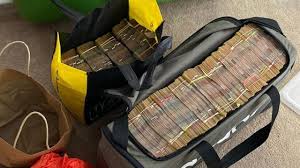Seven waterfront properties, cash, cryptocurrency, and bank funds have been seized by the AFP following a money laundering investigation on the Gold Coast.
A total of $15.6 million in assets have been confiscated by an AFP-led taskforce targeting money launderers using Australian real estate to wash cash.
The AFP restrained waterfront properties, a high-rise unit, cash, cryptocurrency, and funds held in bank accounts following a money laundering investigation on the Gold Coast.
The AFP-led Criminal Asset Confiscation Taskforce applied to restrain the assets under the Proceeds of Crime Act 2002 (Cth) in the District Court of Queensland on 26 July.
The assets include seven Queensland properties worth an estimated $12.96 million, cryptocurrency worth an estimated $514,000, $1.95 million in cash, and approximately $118,000 held in bank accounts.
The seizures are just the latest example of the way Australian real estate is being targeted by money laundering gangs – as highlighted in the latest issue of Australian Conveyancer.
The investigation commenced as a result of intelligence provided by AUSTRAC relating to two Russian nationals, a man, 49, and a woman, 46, who are now the subjects of the restraint action in the District Court.
The man and woman moved to Australia in 2015 and are alleged to have laundered funds into Australia using several methods.
Police alleged the funds were used to purchase or rapidly repay mortgages for multiple Queensland properties, including waterfront properties in Hope Island, Broadbeach Waters and Runaway Bay, houses in Labrador, Alexandra Hills and Mount Gravatt, and a high-rise unit in a Milton complex.
The man and woman were charged earlier this year with dealing in the proceeds of crime after an investigation by the Gold Coast Joint Organised Crime Taskforce.
Acting Commander Amelia McDonald said the confiscation taskforce worked with criminal investigators to identify and restrain potential proceeds of crime to deliver the maximum impact possible on the criminal environment.
“People engaged in money laundering are motivated by greed and an intent to make illicit profits. We work tirelessly with our partners to disrupt their criminal activities and remove their ill-gotten wealth,” she said.
“The AFP’s ability to target the means by which criminals launder their money and seize these profits sends a message to criminals – all your wealth is an illusion which will disappear when we knock on your door.”
The AFP, Australian Border Force (ABF), Australian Taxation Office (ATO), Australian Criminal Intelligence Commission (ACIC) and AUSTRAC worked together on the operation.
Once forfeited to the Commonwealth, confiscated assets are sold and distributed by the Attorney-General for crime prevention initiatives, diversion programs or other law enforcement measures.
The proceeds of crime laws provide authorities tools for the restraint of both proceeds and instruments of crime, as well as financial penalties and unexplained wealth orders, based on a civil standard of proof.
These laws operate separately to any criminal prosecution and can also operate when there is no related criminal investigation or prosecution.
Since July 2019, more than $1.1 billion in criminal assets including houses, cars, fine art and luxury yachts has been confiscated by police.






